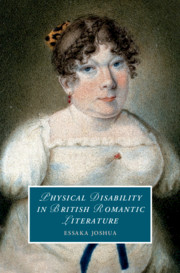Book contents
- Physical Disability in British Romantic Literature
- Cambridge Studies in Romanticism
- Physical Disability in British Romantic Literature
- Copyright page
- Dedication
- Contents
- List of Illustrations
- Acknowledgements
- Introduction
- Part I Politics of Ability
- Part II Aesthetics of Deformity
- Conclusion
- Appendix Dictionary Definitions of ‘Disability’ and ‘Deformity’
- Notes
- Bibliography
- Index
- Cambridge Studies in Romanticism
Introduction
Published online by Cambridge University Press: 09 November 2020
- Physical Disability in British Romantic Literature
- Cambridge Studies in Romanticism
- Physical Disability in British Romantic Literature
- Copyright page
- Dedication
- Contents
- List of Illustrations
- Acknowledgements
- Introduction
- Part I Politics of Ability
- Part II Aesthetics of Deformity
- Conclusion
- Appendix Dictionary Definitions of ‘Disability’ and ‘Deformity’
- Notes
- Bibliography
- Index
- Cambridge Studies in Romanticism
Summary
Disability studies has redefined our understanding of the relationships between bodily and mental particularities and their social and physical contexts. In the broad-survey scholarship, four distinct claims continue to be made: (1) that the late eighteenth century is a period of transition from disability being understood as a supernatural sign to disability being regarded as a scientific phenomenon (the prodigy-to-pathology thesis); (2) that multiple ideas of disability circulate and recirculate at the same time and across time (the recirculation thesis); (3) that the modern sense of ‘disability’ emerges during the early nineteenth century as a product of changes in government administration (the administration thesis); and (4) that the modern sense of ‘disability’ emerged out of a number of disciplinary practices, including the development of statistics as a way of measuring norms (the normalcy thesis). This book challenges these paradigms, arguing for the development of historically appropriate concepts of disability, and demonstrating the benefits of abandoning the anachronistic term ‘disability’.
Keywords
- Type
- Chapter
- Information
- Physical Disability in British Romantic Literature , pp. 1 - 30Publisher: Cambridge University PressPrint publication year: 2020

